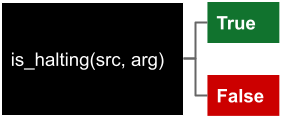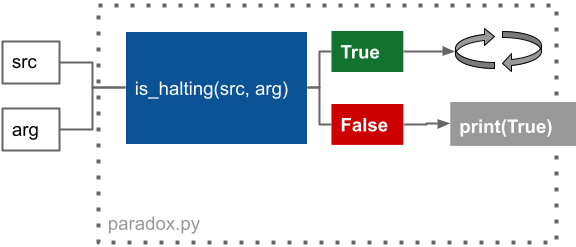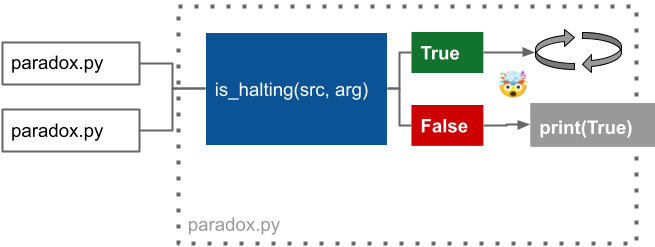The Halting problem
An interesting decision problem I’ve read about is called the Halting problem.
Decision problem
In short, a decision problem is basically a question regarding some input(s) that is answered by yes or no (true or false).
For example: Given 3 integers x, y and z, is the addition equals to 100?
This decision problem has an effective solution to find the correct answer, no matter the input, it is decidable.
Ok, that’s not very impressive. As opposed to decidable, some decision problems are said to be non decidable i.e. there is no existing method to guarantee a correct answer for any inputs. This is the case for the halting problem.
The halting problem
The question is: Is it possible for a program to determine if another program given an input will eventually halt (or loop forever).
Note that it’s a decision problem because we have a question regarding some inputs (a program P and an input I) that is answered by yes or no (P will halt or not).
For this problem to be decidable, we need to find a program that finds the correct answer no matter the program it is given. I can tell you the answer right now, it is not decidable, there is no such program.
Alan Turing actually solved it in a clever way by using reductio ad absurdum.
Suppose we have a program R that takes 2 inputs: a program P and another input I, and is able to tell us if P(I) is going to halt or not.

Now, imagine if we create a program R' that gives its 2 inputs to R and:
- if the result of
R(P, I)is true i.e.PwithIwill halt, then it loops forever. - if the result of
R(P, I)is false i.e.PwithIwill not halt, then it returns true.
something like this:

What happens if give our program R' to R'?

R' will give R' to R and so we have 2 cases:
- if
R'is supposed to halt,Rwill return true, which will makeR'loop forever - if
R'is not supposed to halt,Rwill return false, which will makeR'halts and return true
In both cases, we have a paradox: when R tells us that R' is supposed to halt, it loops forever and vice versa.
We started with the assumption that R would be able to tell us whether a program is going to halt or not and we ended up with a paradox, therefore the assumption was bad.
An example with some python
Same story, let’s assume that there is a function is_halting that takes 2 arguments:
- the content of a source file
srcthat is given an input. A source could be:src = "print('args:', arg)" - another input
arg
When this function is executed, it either returns True or False depending on whether src associated with arg will halt or not.

Now, let’s make a program paradox.py that wraps our function.
Basically, we want to make a program that gives some source code and an argument to is_halting and if it returns True, it loops forever, else -if it is not supposed to halt-, we will print True. It could look like:
# ...
src = sys.argv[1]
arg = sys.argv[2]
result = is_halting(src, arg)
if result == True:
# loop forever
while True:
pass
else:
print(True)
Finally, let see what happens when we give paradox.py to itself:
- If paradox.py is supposed to be halting, we will loop forever, meaning
paradox.pyis not halting. Oops. - If paradox.py is not supposed to halt, we will get an answer, meaning it is actually halting. Oops, I did it again.

We can then conclude that there is function is_halting that can gives a correct result.